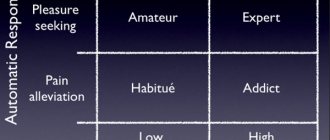Purpose and meaning of life
It is human nature to set goals, that is, to set certain goals in one’s activities. Goals are set depending on needs, on how a person imagines his life.
Why do I live, what is the meaning of my life? People have been thinking about these questions for centuries. And the answers to them are different for each person. There are many factors that influence this: upbringing, education, environment, family, the era in which a person lives, even age and much more.
The goal of life is a certain guideline that a person strives for in his life.
The meaning of life is a person’s conscious perception of the direction of his life, the desire to realize his capabilities in accordance with the values that he considers important for himself.
There are several concepts about what the meaning of human life is.
Concepts of the meaning of life
| Concept | The essence of the concept |
| Asceticism (from Greek: practicing something) | The need to be content with little in life, limitation and suppression of sensual desires and drives, “mortification of the flesh.” |
| Hedonism (from Greek pleasure) | The meaning of life is pleasure, you need to be able to enjoy everything, get pleasure from life. |
| Pragmatism (from Greek action, deed) | Treat life with calculation, achieve goals by any means. |
| Utilitarianism (from the Greek benefit) | To live is to benefit from everything. |
| Eudaimonism (from Greek happiness, bliss) | The purpose of a person is to be happy in this life, to achieve happiness. |
| Altruism (from Latin other, others) | Life is self-sacrifice in the name of serving an ideal, people, society. |
Meaning of life
What is a sense of life? Serve others and do good.
Aristotle
Many people ask the question - what is the meaning of life?
And then they diligently search for the answer to this question, studying a variety of opinions of famous and not so famous people, which can be found in numerous sources of information. And there are many opinions on this matter. Some people see the meaning of life in one thing, some in another, and some in a third. But in this article I will show you, dear readers, that the answer to this eternal question lies on the surface, it is quite simple and obvious and you don’t need to look for it anywhere. This answer suggests itself; we only need to take a closer look at our lives, and then we will immediately understand everything. And our life is at the same time simple and complex - it is simple in its design, but complex from the point of view of the process itself, when a person needs not only to be able to survive in this far from friendly world, but also to leave something behind. The only question is: what and why do we need to leave behind and how to do it? This is what I will answer in this article in order to explain to you, dear friends, what the meaning of human life is. First of all, I want to tell you right away that a person who asks a question about the meaning of life is, from my point of view, a real person, a reasonable person, a person who knows how to think beyond the framework of his animal needs. Animals do not question the meaning of life - they simply live. Their task is to survive and leave offspring to continue their family. But man is the only creature on this planet who wants to know why he should live, why he should survive, for what, for what purpose? And this is a very good, very correct question. So, friends, when you think about the meaning of life, you confirm your rationality.
So, looking at people’s lives, as if from the outside, and reflecting on it, I came to the conclusion that there is an objective and subjective meaning of life. The objective meaning of life is expressed in the fact that a person needs to continue his family, leaving behind offspring. The instinct of reproduction calls him to this. That is, we need to continue the human race in order to preserve humans as a species. In fact, many of our instincts are aimed precisely at this, not only the instinct of reproduction, which means that this is the objective meaning of human life. Thus, from the point of view of nature, we, like animals, must survive and reproduce, we must continue our race - this is our task. You may ask: why do we need to continue the human race, for what purpose? Honestly, friends, I don’t know this, and no one can know this. But we can assume that all processes in the Universe occur in order to achieve some ultimate goal, which you and I cannot know about, because we shouldn’t. Our task is to survive. Rather, we must pass on our genes to our descendants, and thus play our part in the long history of evolution. And no one knows for what ultimate purpose we [people] need to do this. The fact that we live primarily to ensure the immortality of human genes was written by such a famous English scientist as Richard Dawkins, who explained this idea very well in his book “The Selfish Gene.” Dawkins wrote that it is the gene, and not the individual or the population, that plays the main role in evolution, and the main task of the gene is to survive and reproduce, in conditions of fierce competition with other genes. In fact, many people who think about the meaning of life come to this thought, because it is quite obvious that regardless of our desires, our instincts push each of us to reproduce. The task of passing on our genes faces each of us. So, again, from this point of view - we are no different from animals - we need to survive and reproduce in order to continue the life of our species.
On the other hand, we still want to know for what ultimate purpose we provide immortality not only to our genes, but to human genes in general; we want to understand what is the meaning of life for humanity as a whole. After all, as Viktor Frankl wrote in his books, by reducing the meaning of life to procreation, we do not answer this eternal question, we do not close it completely, but we shift it onto our descendants. I rather disagree with this point of view than agree, since man’s ignorance of the ultimate goal of the existence and development of everything in the Universe in general does not leave the question of the meaning of life open. I believe that we humans are intermediate links in some big thing, we are part of some kind of plan, or perhaps part of an experiment conducted by someone who created the Universe with all its laws. This is possible, you will agree. Our task is to play our role for a certain period of time in the material world, and possibly in the intangible, after which we must provide such an opportunity to other people - our descendants. I would compare us humans to individual frames of a film that have to do their job in just a split second, but which ultimately make up a whole movie with meaning. Here you and I are a piece of the Universal meaning of life, and this is the objective meaning of our own life. Thus, our genes strive to prolong their immortality, and we must help them with this in order to allow them to come to what the Universe will eventually come to.
Do we need to know what the Universe is striving for, what is its ultimate goal or the one who created it? I don't think we need to know that. I believe everything has its time. We may not know this, but our descendants will know more, they will know the world even better and will understand something that we do not understand now. You and I see, according to the instincts inherent in us by nature, that we need to survive and reproduce, and also do everything so that humanity not only survives, but also develops, which means this is exactly what we need to do, without puzzling over what we need to do. eventually the existence of humanity will end. This is the meaning of our life, the objective meaning. However, you can think about this topic, because it is a very interesting topic. And we will do it.
Now let's talk about something more interesting - about the subjective meaning of our life, that is, about what we ourselves may want to live for. Think about what, for what purpose, do you want to live your life? There is no need to look for the meaning of life - come up with the meaning yourself. Decide for yourself what you want to live for. Animals do not have such a choice - their life is configured exclusively for self-reproduction, for the sake of objective meaning, that is, for the sake of some ultimate goal towards which nature, the Universe, and/or the one who created it strives. But you and I can choose what to devote our lives to, in addition to our main goal - the continuation of our kind. Is not that great? In my opinion, this is simply wonderful, you and I are simply lucky - we can live not only for the sake of achieving some unknown goal that the Universe is striving for, but also for the sake of something of our own that we can call the subjective meaning of our life . And each of us may have our own ideas about what and why we should live. We all may also have different goals in life. So, by ensuring immortality for our genes and the genes of humanity in general, we can also live for ourselves - by realizing ourselves in some meaningful and interesting business for us, achieving success in something that is important to us, and thus leaving our a name in history, or simply, without any hope of glory, by giving humanity something that, after our death, will benefit it and exist for a very long time. This approach to life makes it terribly interesting. We can make any fairy tale come true, pleasing both ourselves and others.
It is also very important to understand that each person’s life is unique in its own way, just like the person himself. It follows from this that each of us came into this world to play our role, to make our contribution to the history and development of humanity and the Universe. Each of us has a benefit, the life of each person is priceless and meaningful! Therefore, no matter what choice you make when deciding what to devote your life to, you will in any case make the right choice - you will play a role that will contribute to the development of the entire Universe. The life story of every person who has ever lived on earth is an invaluable experience for the Universe, you and I are all part of a single whole, without us the whole cannot be whole. Therefore, your life, in itself, regardless of how you live it, has meaning for all of us, since it is part of us all. Just as a person cannot consist only of bones or only of meat, so the Universe cannot be complete without each of us and cannot develop without the experience of each individual person. So the life of each of you, dear readers, is priceless! Even if you cannot pass on your genes further and do not achieve anything in your life, do not create anything significant - your life will not be meaningless. You will still make your contribution to the general history of mankind and the history of the Universe, it will just be small, important, necessary, but small. Just don’t forget that you can always achieve more, so strive for more, try to be a more significant person, both for others and for yourself.
And yet, how to make a choice - what to devote your life to? I believe it should be dedicated to something that will last for centuries and serve humanity for many years to come. It seems to me that this is the best option for any person who wants to live their life brightly and interestingly. Make your contribution to our history, give the world something that will make it richer, better, more beautiful, and I assure you, you will feel great satisfaction in your life, you will feel important - you will find the meaning of life. There is only so much measured out to each of us, so every wasted minute is a lost piece of life. Therefore, there is no need to wait for anything - you need to go and do something grandiose and outstanding. Some of us will be able to successfully pass on our genes and thus gain genetic immortality, and some of us will do something for humanity that will remind us of it for many years. But there are also people who will simply waste their lives and disappear into oblivion, leaving no offspring, no significant results of their work, no legacy. This is, perhaps, the most terrible thing for a person - when there is practically no meaning in his life, when he simply lives to live his life, to, so to speak, serve his number and leave this world forever. But this is not a person’s fate - it is largely his choice. I won’t speak for everyone, situations are different, but many of us have a choice about how to live our lives. We can strive to leave behind worthy offspring or some significant results for humanity, or better yet, both, this is possible. Or we can simply waste our lives, not being remembered for anything and leaving behind not only worthy, but no offspring at all.
I wrote above that one way or another, we all contribute to the history of mankind and to the development of the Universe, therefore the life of every person has meaning, the life of every person is priceless. But that doesn't mean we shouldn't strive to make our mark on the world. After all, the more we leave behind, the more good we manage to do in our lives, the more satisfied we will be with our lives.
So, friends, the choice is yours - decide how and for what you will live. Will the meaning of life for you be to follow the laws of nature, the laws of the Universe, or, if you like, the laws of God, according to which you need to pass on your genes in the most successful way, thus continuing the human race, and/or will you decide to achieve outstanding success in life in any way? in order to leave something significant behind for people, for humanity, for everyone in the world. You are quite capable of succeeding in both matters. Leave behind worthy offspring and realize yourself in some matter that is important to you and preferably for other people, in order to leave your mark in this world, and you will be completely satisfied with your life, because it will really have a lot of meaning. I wish you good luck with this!
Self-realization
Self-realization is the process of realizing one’s abilities, abilities, skills in society, the ability to apply knowledge, and achieving goals. This is one of the highest human needs.
Self-knowledge is the process of a person learning about himself, his capabilities, moral qualities, and his own physical and mental characteristics.
Types of self-knowledge
- Direct – self-observation
- Indirect – analysis of one’s own activities and actions.
Paths of self-discovery
- Self-recognition is when a child becomes aware of himself as an individual person.
- Knowing oneself through knowing others - a person evaluates the actions and actions of others, accepting them or not, this is how personality qualities and worldview are formed.
- Self-esteem is a person’s emotional attitude towards himself, acceptance or not of his own behavior.
- Assessing the results of your activities, your behavior, self-observation.
- Self-confession is a person’s internal report to himself about his actions, actions, and attitude towards people.
Types of self-esteem
- Adequate or realistic - a person is objective in assessing himself.
- Inflated self-esteem - a person thinks of himself better than he really is.
- Low self-esteem - a person underestimates himself, his abilities and capabilities.
“I” is a concept – a person’s stable idea of himself.
Liberty
It is human nature to want to be free. What is freedom? When does a person realize that he is truly free? And are there any restrictions on freedom?
Freedom is a person’s ability to choose decisions and actions in accordance with his desires, needs and goals, interests; This is the absence of any restrictions on anything.
But can a person be absolutely free in society, and will freedom not become permissiveness?
IN AND. Lenin wrote: “It is impossible to live in society and be free from society.”
Limiters of human freedom in society
- Law. A person cannot transgress it, which means he is obliged to behave within certain limits.
- The freedom of another person, therefore a person is obliged not to violate the boundaries of the freedom of another, not to achieve freedom for himself for the sake of limiting it for another.
- Responsibilities are actions that a person must perform in accordance with the laws established in society (the obligation to protect nature, protect the homeland, etc.)
- Responsibility is the need to perform certain actions in accordance with moral and legal laws in society, to be responsible for one’s actions before people (legal, political, moral responsibility).
Voluntarism is the absolutization of freedom, bringing it to arbitrariness, permissiveness, the absence of any restrictions in human behavior, ignoring objective conditions and laws.
Fatalism is a belief in fate, in predestination, the exclusion of the possibility of choice, and therefore the denial of freedom in general.
Ideals and goals
The philosophy of success as a component of the American dream becomes the general content of human existence. The acquisition of wealth is understood as the art of quantitative creation. Money acquires the status of an equivalent of social energy and awakens in modern Homo a feeling of possible pleasure. It is money that prevents freedom from narrowing to the framework of rigid determinism (being a “conscious necessity”).
The forerunner of the “philosophy of success” can be considered the line of hedonism and bon vivantism, passing on to the French materialist philosophers of the 18th century.
Almost all catechisms on the “philosophy of success” and “textbooks for quick happiness” note that if it is impossible to change reality, then you need to change your attitude towards it. The not quite ripe V. Zeland thoughtfully notes: “If you are hostile towards the world, it will answer you in kind. If your attitude towards reality is dominated by negativity, then the world will turn its worst side towards you. On the contrary, a positive attitude will naturally change your life for the better. A person gets what he chooses”[1].
As numerous adherents and neophytes of the “philosophy of success” persistently assert, at the first stage on the path to “success” it is absolutely necessary to have a clear and firm goal - “thought form” (most often - “to have a lot of money”). It is recommended to start the process of achieving your goal right here and now.
Obviously, we should especially highlight the fact that thought precedes not only material success, but also any changes in the circumstances of life itself. The desire to understand the world is a necessary initial stage in remaking objective reality. In other words: any human activity presupposes the presence of thought and knowledge. Because. As the founders and classics noted, “whatever moves men must go through their heads.”
Figuratively speaking, two large streams-rivers made their way through historical eras. One stream is “We”: concerns and deeds dedicated to society. The other river represents the “I”: the individual’s desire, sensitively following the fluctuations of reality, to have time to rush towards himself (to achieve “success”).
It has long been noted: where there is reality, there is also an ideal. The rebellious-transforming mind existed in antiquity, having a utopian orientation. One of the first was Plato’s “utopian discourse.” It represents the ideal forms of human coexistence.
The multitalented Aristotle in “Politics” criticizes Plato’s theoretical position for his desire to introduce complete unity in the state, regardless of the actually existing plurality. The differences between Plato and Aristotle reflected the painful contradiction between ideal and reality, what should be and what is.
The word “utopian” (a place that does not exist) appeared in the 16th century shortly after the publication of T. More’s book “Utopia”. The formation of this genre encourages us to reread from a utopian point of view the works preceding T. More's book. In addition to Plato’s “Republic”, we are referring to numerous fragments of the Bible, and A. Blessed’s “City of God”. Etc.
Eternal and unchanging ideals were appreciated by Christians. The immortality of the ideal is ensured by its fundamental unattainability. For a very long time, utopian dreams have been created about rewarding the righteous and providing them with paradise. Eden is the most ancient utopia in all of world culture, hell is the most ancient dystopia.
Idealistic utopian consciousness is generated by a critical attitude towards reality and an irresistible desire to reform it. The utopian is concerned with the embodiment of the ideal of a perfect society and is aimed at the salvation of all humanity. Utopia is a denial of the present and a rebellion against reality. From the marriage of fantasy with desire, something more is born than real life allows.
No matter how paradoxical it may seem, utopias are at the heart of all social transformations. It is the utopian-creative worldview, the will to start history anew, that becomes the palladium on which political ideologies and strategies grow. Every utopia is religious to some extent.
Speaking against the ideological opponents of Plato’s republic as “an unrealizable perfection, possible only in the mind of an idle thinker,” I. Kant proposed to evaluate the ideal not by the possibility of its practical implementation, but by the role it plays in the life of man and society. Each concrete step in the context of following the ideal is at the same time the realization of a particle of the absolute. An ideal is not a guarantee of absolute perfection, but a stimulus and condition for endless development.
An ideal can be interpreted as an absolute goal that is always ahead. An absolute goal can never become a means to another goal. Ideas and ideals are ultimately stronger than people themselves.
Comprehensive idealist G.V.F. Hegel did not become an active member of the Prussian Academy and believed that the goal of an individual is something that “he is able to accomplish with benefit to society and interest for himself.” The great philosopher understood the absolute goal as a contradiction between the individual and the general, which is ultimately resolved in favor of the general.
A person’s total dependence on the hardships of life forms a slave consciousness, and complete independence from inhuman conditions of existence turns him into a Stoic consciousness. Slave consciousness is a chain that fetters a person. Stoic consciousness makes a person free, but this freedom is largely illusory. For, abstracting from real problems, the individual becomes powerless in the face of cruel reality. Without transforming reality, a person falls into a kind of somnambulism.
Hegel said: “contradiction is resolved, contradiction cannot be stopped, contradiction in itself is unbearable.” But the great idealist says nothing about what “resolution” of the contradiction actually means.
The founder K. Marx initially saw the intellectual means for justifying the possibility of a transformative principle in life's struggle in the analysis of the views of advanced ancient thinkers. In his doctoral dissertation “The Difference between the Natural Philosophy of Democritus and Epicurus,” Marx showed that Epicurus essentially put forward the idea of dialectical self-motion, interpreting it as a principle of activity and activity. For Hegel, antiquity is the embodiment of an ideal, and for Marx it is the childhood of humanity.
According to Dr. Marx, over the course of many centuries, man has created a culture that he can master only after liberation from the yoke of economic poverty and overcoming spiritual impoverishment in the world of alienated labor. Marx's comprehensive system had a distinct ethical component, designed to appeal not only to human reason but also to the sense of compassion.
Christianity and the Russian idea arose before Marxism and the moral code of the builder of communism. The fact that some of the ideas were borrowed is obvious.
It may be noted that the graduation school essay, written in 1835 by the young K. Marx, had a strange title from the point of view of atheized Marxists: “The unity of believers with Christ according to the Gospel of John, chapter 15, v. 1-14, its reason and essence , absolute necessity and the influence it has had.” The central question of this work is formulated by the author as follows: is a person able to independently, without unity with Christ, “achieve the goal for which God created him from nothing?”[2].
Answer to “5+”: “Without unity with Christ we cannot achieve our goal.”
“In unity with Christ,” writes K. Marx in his work, “we first of all turn our loving gaze to God, feel the most ardent gratitude to him, and joyfully fall on our knees before him. And then, when, thanks to our unity with Christ, a brighter sun rises for us (communism - S.E.), when we feel all our rejection and at the same time rejoice over our salvation, only then will we be able to love him God, who previously seemed to us an insulted ruler, is now an all-forgiving father, a kind mentor”[3].
The author of the all-conquering doctrine clearly understood the meaning of life as practical activity to change the world around us. This life position led Marx to a rather complex and ambiguous relationship with his parents. The ironic aphorism of Gengrietta Marx is widely known that her son would have acted much smarter if he had acquired capital for himself, instead of writing a book about it.
It is noteworthy that the American Dream also has points of contact with certain provisions of Marxist theory. Elements of identity have been noted more than once by some social scientists in the United States. “Our research,” wrote, for example, R. Goodwin, “begins with an affirmation of the similarities between Marx’s utopia and the American dream. Both proceed from the belief that all people have equal rights in the field of material well-being, and that equality constitutes the necessary basis that opens to people the “realm of freedom”, the development of “human potency” or the “search for happiness”[4].
To give a correct assessment of any philosophical concept, the following question should be asked: “Does the author of the new philosophical system apply his conclusions in his own life and work?” “Ordinary” people prefer only to be with the minority in their thoughts, and with the majority in their speeches.
The real universal meaning of the phenomenon of non-spiritual wealth was first recognized by Socrates. Socrates' method, which developed in the context of the commercial activities of the Sophists, was based on the practical idea of the universal good. But the consciousness of the great thinker could not withstand the heavy weight of rationality. Ultimately, Socrates was forced to come to the deepest discord with his kindred Greek community and legalized suicide.
The standard sage Socrates said: “It is better to die with dignity than to live unworthy, and nothing bad will happen to a good person either here or after death. And after death the gods will support him.” This is an interesting position - a person, without leaving (completely) from society, has an independent existence. And both in this life and after death. Socrates preached, in essence, a fair amount of banality: comprehension of the Truth is more important than the struggle for power. The audience nodded politely and prepared to leave. And only after the death of Socrates they began to regard him as a curious incident.
“The Tragedy of Socrates” is practically the first attempt at a rational dialogue between wealth (“success”) and thought. It became the leading theme of Plato's dialogues and the subsequent object of critical examination by Aristotle.
Hamlet's famous question “To be or not to be?” One can put a “political spin” and formulate the greatest dilemma as follows:
To be is to “resist fate”, to recognize the world as not (entirely) reasonable. And also - to create “ideal substances” and transform objective reality. The favorite sight of the Gods is a mortal entering into battle with fate.
Not to be means to recognize social reality as reasonable and, having “fallen under the blows of fate” not only physically, but also spiritually, manage to achieve a certain material “success” and acquire capital.
A non-rhetorical question arises: how to separate “to be” from “not to be” and determine (shift) the boundary between the possible and the impossible in the social sphere? How to make the impossible possible?
Everything new is well forgotten old. Perhaps the watershed can be found in the ancient maxim: God grant me the strength to change what I can change (realize ideals), come to terms with what I cannot change (and materialize pragmatic goals) and the wisdom to distinguish one from the other. Wisdom is a system of knowledge and intuition. Recourse to the help of the wise is a characteristic of the great.
[1] Zeland V. Transurfing of reality. - St. Petersburg, 2005. - P. 25.
[2] Marx K.. Works. T.40 / K. Marx, F. Engels, - 2nd ed. - M., 1975. - P.590.
[3] Ibid.- P.592.
[4] Goodwin R. The American Codition. - New York, 1974. - P. 18.
Human inner world
Macrocosmos (or macrocosm) is a person as a part of the larger cosmos, the universe.
Microcosm ( or microcosm) is a separate unique world, which is characterized only by humanity.
The spiritual world of a person is a complex system of a person’s relationship to the world around him, society, people; these are his internal assessments and self-esteem, the world of interests, inclinations, views, ideals, ideas.
Worldview – a person’s views on the world, society and himself.
Types of worldview
- Scientific - recognition of the decisive role of scientific knowledge in understanding the world, denial of everything that has not been proven by science.
- Parascientific (from the Greek “outside”) – suggests the existence of another world, another dimension (parallel world, alien intelligence).
- Religious – based on belief in the supernatural, in God and gods.
- Atheistic – denial of the existence of God and higher powers.
- Everyday (ordinary) - it is based on life experience passed on from generation to generation.
The humanistic worldview is recognition of the value of every person on earth, based on love for people and respect for them.
A misanthropic worldview is based on contempt for other people, nations, and the promotion of national exclusivity.
Revolutionary - it is based on advocating drastic, fundamental changes in society.
Conservative – based on distrust of changes in society, preference for everything that is established.
Read more about WORLDVIEW HERE.
Answer:
A person has a soul and an energy-informational essence (EIS) - our consciousness, which includes our memory. The difference between the soul and EIS is as follows. The soul is an ever-living intelligent substance consisting of leptons - ultra-small particles unknown to science. Therefore, it has the property of superfluidity, i.e. penetration through any structure of the material world. After the death of the physical body, the soul, depending on the level of consciousness of the deceased, penetrates into different levels of the invisible, otherworldly or afterlife through the information and energy barrier.
The soul remains in these Subtle worlds until the next incarnation into a new body at its birth. At the same time, leaving the body of the deceased, the soul takes with it 3 subtle energy shells (EIS) from the person’s aura, on which the entire life of this individual is recorded. The connection between the brain and the soul is directly blocked by the Creator. During sleep, our soul goes to the Subtle World and from where it brings information, in the form of dreams, concerning the upcoming events in the life of a given person. This information is recorded in a person’s memory in encrypted form, allegorically in the form of allegories (this is why dream books exist to decipher the meaning of dreams).
Therefore, the answer to the question of what is the purpose of human life on Earth is self-improvement of consciousness (EIS), which at the end of life will pass to the soul. The Creator contains in the human genome all possible positive and negative emotions and actions associated with these emotions, as an experiment.
To improve consciousness, a person needs:
- 1) minimize the use of negative emotions and negative reactions to them in your life: this is anger, hatred, envy, deception, lies, rudeness, meanness, greed, forgery, bribery, betrayal and cruelty, which a person uses to achieve his own selfish goals;
- 2) take into account the importance of increasing the level of spirituality - sincere faith in God, turning to him through prayers, observing commandments and rituals whenever possible, honoring the main divine holidays;
- 3) self-education and training to increase the level of knowledge in those areas to which his consciousness strives.
By adhering to these 3 points, a person increases the frequency of vibrations of the gene structures of his body, which is ultimately recorded in his soul. In addition to the above, you need to know that the Creator of the Universe - the Supreme Mind - has its own Divine consciousness - this is the Absolute or Red Fire, which spreads throughout the Universe. This substance penetrates everywhere and in every person there is a piece of the Divine consciousness of the Higher Mind that has penetrated into him, with the help of which he knows about each of us, living each of our lives with us.
About the meaning of human life in cycles of rebirth on Earth
When our soul enters the highest - seventh level of the Subtle World after death, it reaches the Absolute - the consciousness of the Higher Mind. The purpose of human life on Earth is to turn inward, which is possible in the presence of the above, because the consciousness of the Higher Mind is within us and we must strive for unity with it. We need to understand this so much that it enters the heart, mind and, at the end of life, into our soul. A person needs to understand and accept that the future of civilization is predetermined and is being carried out according to the plan and will of the Higher Mind and will not be left to chance. He lives everyone’s life with love and great interest; he is interested in everything that concerns the evolutionary development of his brainchild - man, as a part of himself. Its goal is to understand oneself through the experience of human development. The evolutionary development of man is a grandiose cosmic experiment of the Supreme Intelligence and the Creator. Currently, there is a preparatory period for the transition of our civilization to a new, next level of consciousness and development.
Material provided by Anatoly Leonidovich Khitrov
Views 3,872
Some terms
- Tolerance – from lat. tolerance, a tolerant attitude towards people of different views, if they do not pose a threat to others.
- Pessimism is the belief that nothing good can be expected in life, that things will get worse.
- Optimism is a belief in the best, in the strengths and capabilities of a person, in the fact that life is wonderful.
- Skepticism is doubt in everything that happens and will happen in life (in the possibility of knowledge, in the fact that positive changes will occur in society in a person’s life, etc.)
- Altruism is a moral position based on love for people, the desire to live for them, and the willingness to sacrifice oneself for the good of society.
- Compromise is the ability and ability to sacrifice some of one’s interests for the sake of solving common problems, mutual concessions of the parties.
- Consensus is complete agreement, a unified approach to solving a problem or on some issue.
- Egocentrism is guidance in actions and deeds based on one’s own whims, needs, indifference to others, inability and unwillingness to consider a different point of view. Egocentrism is a characteristic of an individual that determines his inability to consider the point of view of other people, the inadmissibility of the idea that someone else’s idea may be correct.
An egocentric person perceives an exclusively personal point of view as the only correct one. An egocentric person is confident that his thoughts are authoritative, he finds himself omniscient, and others are narrow-minded and does not take into account their views.
Finding meaning in life: an example
In an essay on social studies, “The Purpose and Meaning of Human Life,” a student can mention the fact that the main meaning-forming components for most people are the opportunities to create, serve other people, realize their talents and abilities, and sacrifice themselves in the name of a great goal. Often the main component is the opportunity to do something for another person. This can be clearly illustrated by the story of an electrician who, at the age of 30, fell ill with an incurable disease. All his life he argued with others and loved to drink. With only a few months left to live, he was completely alone. The electrician spent all his time in front of the TV.
Attitude to life
- An active life position is an attitude to life when a person is an active participant in events, an initiator of many things, he influences everything that surrounds him, he can change a lot within his power.
- A passive life position is an attitude to life when a person is only an observer of events, often simply adapting to them.
- Conformism - from lat. like; adaptation, when a person does not defend his positions, points of view, principles, passive agreement with everything that happens around him.
- Nonconformism - from lat. not + similar; the desire to constantly defend one’s position, one’s point of view, sometimes putting others in an awkward position, even if these points of view contradict those prevailing in society or a group.
Read more about your life position HERE.
Happiness is a feeling of complete satisfaction of one’s desires, the fulfillment of a dream, the joy of realizing self-realization and need. Although, you must admit, everyone understands happiness in their own way.
Material prepared by: Melnikova Vera Aleksandrovna










